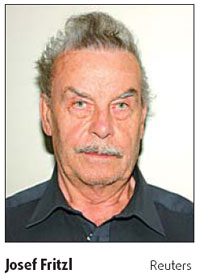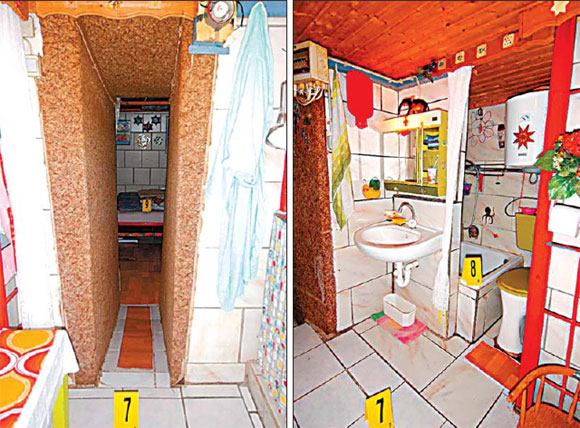Man admits to 24-year perversion of daughter
(Agencies)
Updated: 2008-04-29 08:13
Updated: 2008-04-29 08:13
A 73-year-old Austrian electrical engineer has confessed to holding his daughter captive in a secret, windowless cellar for 24 years and fathering seven children by her, police said yesterday.
|
|
A 42-year-old woman had told police on Sunday that her father, Josef Fritzl, lured her into the basement of the block where they lived in the town of Amstetten in 1984 and drugged and handcuffed her before imprisoning her.
"(Fritzl) has now said that he locked up his daughter for 24 years and that he alone fathered her seven children and that he locked them up in the cellar," said Franz Polzer, head of the criminal investigations unit in the province of Lower Austria.
Fritzl had also admitted to burning the body of one of the children when it died shortly after birth, said Polzer. Austrian media reported he had burned the corpse in a boiler.
Three of Elisabeth Fritzl's children had been locked up since birth in the basement of the plain, grey building along with their mother and had never seen sunlight or received any education, police said.

Austrian investigators were combing through the network of windowless, underground cells where Elisabeth and the children had been holed up.
Some parts of the dungeon were no more than 1.70 meters high and officials in Amstetten said the basement labyrinth even contained a padded cell.
Fritzl had hidden the entrance to the cell behind shelves and only he knew the secret code for the reinforced concrete door, said officials.
The case unfolded when a 19-year-old girl - the oldest of the three - became seriously ill and was hospitalized, prompting doctors to appeal for the girl's mother to come forward to provide more details about her medical history.
Fritzl then brought Elisabeth and her remaining two children out of the basement, telling his wife - who thought their "missing" daughter had chosen to return home, police said.
Elisabeth agreed to make a "comprehensive statement" detailing her ordeal to the police after receiving assurances she would have no further contact with her father, who she said abused her from the age of 11.
Newspaper headlines called the case the "crime of a monster" and the "worst crime of all time". Media asked how authorities and residents of Amstetten, 130 km west of Vienna, could have failed to notice what was happening in the "horror house".
The case, centered on a nondescript two-storey building in the town, was especially shocking because it was reminiscent of that of Austrian Natascha Kampusch who spent eight years locked up in a windowless cell before escaping in August 2006.
"The community of Amstetten should drown in shame ... The neighbors are turning a blind eye," the Oesterreich newspaper wrote in an editorial.
The daily Der Standard wrote: "The whole country must ask itself what is really, fundamentally going wrong".
Police have said they believe Josef's wife Rosemarie had been unaware of what happened to her daughter when she disappeared in 1984 and it was assumed Elisabeth had left voluntarily when her parents received a letter from her saying they should not search for her.
But all the while Elisabeth was being held in what Polzer described as a sophisticated network of chambers with facilities for sleeping, cooking and washing.
Elisabeth gave birth to seven children, one of whom died shortly after being born, police said.
Three of the children - two girls and one boy - were brought up by Josef and his wife after they were left on the doorstep where the couple lived. The first child was accompanied by a note from Elisabeth saying she was unable to care for the baby herself.
Three others - two boys and a girl - including the two eldest aged 18 and 19, and the youngest, aged 5, had been locked up in the basement with their mother since birth.
Kampusch, who spent her teenage years held captive, offered to help the victims and told ORF radio she might talk to the family.
"I can imagine that it is very difficult both for the mother of the children as well as for the wife of the perpetrator to get through this," she said.
Psychiatrist Max Friedrich, who treated Kampusch, said the children were undergoing tests in hospital, in particular for problems with their eyes and skin due to the lack of daylight.
|
||
|
||
|
|
|
|
